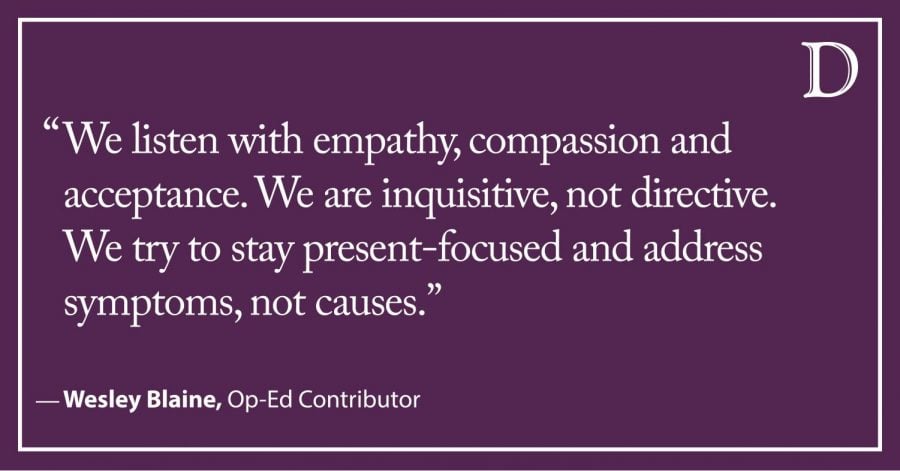Blaine: My experience volunteering at a suicide intervention call center
April 13, 2020
Content warning: This article discusses and describes depression and suicide.
I began volunteering at a suicide intervention call center in April 2018.
To become a volunteer, I had to complete a 60-hour suicide intervention course. On the fifth day of training, I was asked to talk about how suicide had impacted my life. It was 8:00 a.m. on a Saturday. There were thirty people in the room. My eyes began watering because I had never discussed my father-in-law’s suicide with anyone other than my wife. And yet, I knew that I had to talk about what had happened to become more comfortable with it.
My father-in-law was a high school math teacher who would sink into a paralyzing depression at the end of each school year. He would spend the summer in the basement, sleeping and watching TV, while his wife, daughter and son worried about him. This started in the early ’80s, when there were few treatment options for his crushing depression. He eventually entered a behavioral health facility where he was prescribed lithium.
Lithium helped stabilize his mood, but it also caused him to gain weight. Against his doctor’s advice, he stopped taking lithium in 2010 because his weight gain hurt his lower back.
Without that supply of lithium, my father-in-law felt himself slipping into a debilitating depression in the summer of 2011. He phoned my wife on July 5, 2011, right as she was getting ready to do her midday workout. “I heard that sluggish tone in his voice and knew he was sinking,” she told me.
My wife phoned her brother, who lived closer to their dad than we did. Her brother agreed to check on their dad on July 6, once their dad got back from his doctor’s appointment at 11 a.m.
He never got that chance.
Suicide is a difficult subject to talk about because we rarely talk about it. Talking about it can be terrifying — suicide is permanent and morose. Anyone who talks about it can be labeled a “buzzkill” if they boldly decide to broach this topic anywhere other than a therapist’s office.
But we need to talk about suicide because it is the second leading cause of death among college students in the United States. It is the fourth leading cause of death for people between the ages of 35 to 54. And it’s the tenth leading cause of death overall in the United States.
One solution is to talk about suicide in an open and honest way. This conversation should include tools that are available to help someone who may be having thoughts of ending their life.
One tool is the National Suicide Prevention support line. This is a toll-free hotline staffed by trained counselors, 24 hours a day, 7 days a week. It is for anyone who is experiencing a crisis and needs support. A symptom of a crisis is often suicidal thoughts.
I work at this support line with other caring and nonjudgmental people that strive to bring unconditional positive regard to each caller. Many of the callers I’ve talked with were hesitant to call because they did not know what to expect.
We answer each call by introducing ourselves. We then ask for the caller’s name, if they are comfortable sharing, and what motivated them to call us. We will then ask something such as, “Tell me about what got you to call today.”
We listen with empathy, compassion and acceptance. We are inquisitive, not directive. We try to stay present-focused and address symptoms, not causes. We also try to acknowledge and validate the caller’s underlying emotions.
Our end goal is to keep each caller safe. To do that, we ask each caller, “Are you having thoughts of killing yourself?” If a caller answers “yes,” we follow up with a few additional questions: “Do you have a plan for how you would end your life? Do you have the means to do that? Have you ever tried to kill yourself?”
If a caller answers “yes” to any of those questions, we work with that caller to come up with a safety plan that the caller can implement to cope after hanging up.
Everything is confidential, with a few exceptions. We are mandatory reporters, which means that we have to report child abuse and elderly abuse. We have to report homicidal ideation, where a caller is threatening to harm someone else. We also have to report callers that are unwilling or unable to come up with a safety plan, and therefore remain a threat to themselves.
I am honored to work with wonderful, caring co-workers who together helped 130,000 callers in 2019. We are a kind and compassionate team that is here to help you or someone you know through a crisis. Our toll-free number is 1(800)-273-8255. We are available 24 hours a day, 7 days a week.
There is no shame in reaching out for help. Asking for help takes courage, especially during a dark moment. Vulnerability is strength. I wish that my father-in-law had contacted the National Suicide Prevention support line because I’m sure he would have enjoyed celebrating life with his 5-year-old grandson who was born in 2014.
I hope they serve lithium in heaven.
Wesley Blaine is a graduate student at Northwestern. He can be contacted at [email protected]. If you would like to respond publicly to this column, send a Letter to the Editor to [email protected]. The views expressed in this piece do not necessarily reflect the views of all staff members of The Daily Northwestern.












